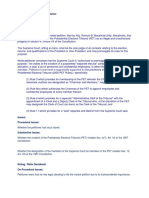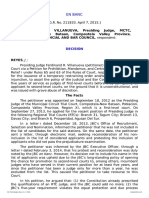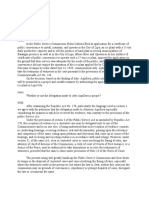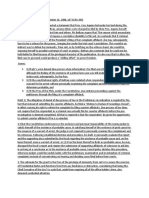0 ratings0% found this document useful (0 votes)
Pedro Cupcupin Vs People
Uploaded by
jilliandaniellePedro Cupcupin was found guilty of illegal drug and firearm possession. He claimed the evidence used against him was obtained through an illegal search, as the search warrants were defective since the NBI agent who applied did not have personal knowledge. However, the court held the NBI agent did have personal knowledge, as he conducted surveillance after receiving a tip from an informant, and was able to confirm the illegal activities himself through investigation. Therefore, the search warrants were validly issued based on probable cause known to the agent personally.
Copyright:
© All Rights Reserved
Available Formats
Download as DOCX, PDF, TXT or read online from Scribd
Download as docx, pdf, or txt
Pedro Cupcupin Vs People
Uploaded by
jilliandanielle0 ratings0% found this document useful (0 votes)
Pedro Cupcupin was found guilty of illegal drug and firearm possession. He claimed the evidence used against him was obtained through an illegal search, as the search warrants were defective since the NBI agent who applied did not have personal knowledge. However, the court held the NBI agent did have personal knowledge, as he conducted surveillance after receiving a tip from an informant, and was able to confirm the illegal activities himself through investigation. Therefore, the search warrants were validly issued based on probable cause known to the agent personally.
Original Title
Pedro Cupcupin vs People
Copyright
© © All Rights Reserved
Available Formats
DOCX, PDF, TXT or read online from Scribd
Share this document
Did you find this document useful?
Is this content inappropriate?
Pedro Cupcupin was found guilty of illegal drug and firearm possession. He claimed the evidence used against him was obtained through an illegal search, as the search warrants were defective since the NBI agent who applied did not have personal knowledge. However, the court held the NBI agent did have personal knowledge, as he conducted surveillance after receiving a tip from an informant, and was able to confirm the illegal activities himself through investigation. Therefore, the search warrants were validly issued based on probable cause known to the agent personally.
Copyright:
© All Rights Reserved
Available Formats
Download as DOCX, PDF, TXT or read online from Scribd
Download as docx, pdf, or txt
0 ratings0% found this document useful (0 votes)
Pedro Cupcupin Vs People
Uploaded by
jilliandaniellePedro Cupcupin was found guilty of illegal drug and firearm possession. He claimed the evidence used against him was obtained through an illegal search, as the search warrants were defective since the NBI agent who applied did not have personal knowledge. However, the court held the NBI agent did have personal knowledge, as he conducted surveillance after receiving a tip from an informant, and was able to confirm the illegal activities himself through investigation. Therefore, the search warrants were validly issued based on probable cause known to the agent personally.
Copyright:
© All Rights Reserved
Available Formats
Download as DOCX, PDF, TXT or read online from Scribd
Download as docx, pdf, or txt
You are on page 1/ 1
Pedro Cupcupin vs.
People of the Philippines
Facts:
Based on a confidential information that the petitioner, Pedro Cupcupin is engaged in selling shabu, and in possession
of firearms and ammunitions without the necessary license, NBI Agent Timoteo Rejano, conducted a surveillance on the vicinity
of petitioners residence. After confirming said confidential information, Agent Rejano applied for the issuance of search
warrants.
Pedro Cupcupin, petitioner, was found guilty of the crimes of violation of Sec 16, Article III, Republic Act
6425,otherwise known as the Dangerous Drugs Act of 1972, as amended, and of violation of Section 1, Presidential Decree of
1866, otherwise known as the Unlawful Possession of Firearms and Ammunition which the Court of Appeals affirmed with
modifications. The petitionerraise the defense of frame-up. Pedro Cupcupin also contends that the items allegedly seized from
his residence are inadmissible because the search warrants were defective on the ground that NBI Agent Rejano who applied
for the issuance thereof had no personal knowledge of the facts on which the warrants were based.
Issue:
Whether or not the NBI Rejano has personal knowledge of the fact which the waarants were based.
Held:
Yes. In determining probable cause in the issuance of search warrant, the oath required must refer to the truth of the
facts within the personal knowledge of the applicant or his witnesses, because the purpose thereof is to convince the
committing magistrate, not the individual making the affidavit and seeking the issuance of the warrant, of the existence of
probable cause. Search warrants are not issued on loose, vague or doubtful basis of fact, nor on mere suspicion or belief.
In the case at bar, NBI Agent Timeteo Rejano who applied for the issuance of Search Warrant Nos. 56-93, had
personal knowledge of the circumstances on which the warrants were based. Admittedly, Rejanos knowledge of petitioners
illegal possession of firearms and prohibited drugs came from a confidential informant, and therefore, initially hearsay.
Nevertheless, the surveillance and investigation he conducted on the basis of said confidential information enabled him to gain
personal knowledge of the illegal activities petitioner. Hence, his testimony was sufficient justification of the examining judge to
conclude that there was probable cause for the issuance of search warrant.
You might also like
- Villanueva - v. - Judicial - and - Bar - CouncilNo ratings yetVillanueva - v. - Judicial - and - Bar - Council30 pages
- Philosophy of Law Chapter 4 DiscussionsNo ratings yetPhilosophy of Law Chapter 4 Discussions23 pages
- Case Digest: Vera Vs Avelino Facts of The CaseNo ratings yetCase Digest: Vera Vs Avelino Facts of The Case1 page
- People vs. Alcantara G.R. No. 207040 July 4, 2018No ratings yetPeople vs. Alcantara G.R. No. 207040 July 4, 20182 pages
- Director of Prisons vs. Ang Chong Kio, 33 SCRA 494 PDFNo ratings yetDirector of Prisons vs. Ang Chong Kio, 33 SCRA 494 PDF10 pages
- Provides or Regulates The Steps by Which One Who Committed A Crime Is To Be PunishedNo ratings yetProvides or Regulates The Steps by Which One Who Committed A Crime Is To Be Punished20 pages
- Garcia v. Board of Investments, 191 SCRA 288No ratings yetGarcia v. Board of Investments, 191 SCRA 2883 pages
- Lito Corpuz v. People of The Philippines, G.R. No.No ratings yetLito Corpuz v. People of The Philippines, G.R. No.2 pages
- Erwin Libo-On Dela CRUZ, Petitioner, v. PEOPLE OF THE PHILIPPINES, Respondent. G.R. No. 209387, January 11, 2016, LEONEN, J. FactsNo ratings yetErwin Libo-On Dela CRUZ, Petitioner, v. PEOPLE OF THE PHILIPPINES, Respondent. G.R. No. 209387, January 11, 2016, LEONEN, J. Facts3 pages
- Comendador v. de Villa, 200 SCRA 80 (1991) - SummaryNo ratings yetComendador v. de Villa, 200 SCRA 80 (1991) - Summary2 pages
- People v. Tongko, G.R. No. 123567, June 5, 1998No ratings yetPeople v. Tongko, G.R. No. 123567, June 5, 19982 pages
- Case Digest No.: Case Title: Citation: Issues: Issue #1: Constilaw1No ratings yetCase Digest No.: Case Title: Citation: Issues: Issue #1: Constilaw11 page
- People vs. Ognayon Justice Lopez Digest Criminal Law100% (1)People vs. Ognayon Justice Lopez Digest Criminal Law2 pages
- 14.G.R. No. L-39993 May 19, 1975 - PEOPLE OF THE PHIL. v. CONSTANTE A. ANCHETA - May 1975 - Philipppine Supreme Court DecisionsNo ratings yet14.G.R. No. L-39993 May 19, 1975 - PEOPLE OF THE PHIL. v. CONSTANTE A. ANCHETA - May 1975 - Philipppine Supreme Court Decisions9 pages



























































